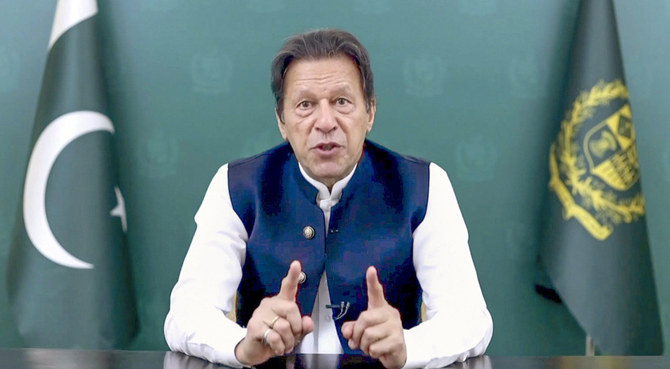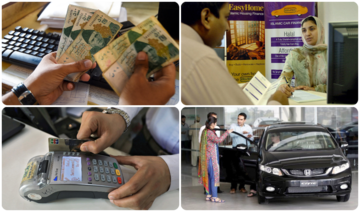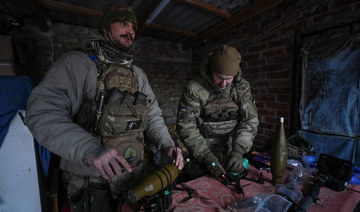NEW YORK: Prime Minister Imran Khan sought to cast Pakistan as the victim of American ungratefulness and an international double standard in his address to the United Nations General Assembly on Friday.
In a prerecorded speech aired during the evening, the Pakistani prime minister touched on a range of topics that included climate change, global Islamophobia and “the plunder of the developing world by their corrupt elites” — the latter of which he likened to what the East India Company did to India.
It was for India’s government that Khan reserved his harshest words, once again labeling Indian Prime Minister Narendra Modi’s Hindu nationalist government “fascist.” But the cricketer turned posh international celebrity turned politician was in turn indignant and plaintive as he painted the United States as an abandoner of both Pakistan and neighboring Afghanistan.
“For the current situation in Afghanistan, for some reason, Pakistan has been blamed for the turn of events, by politicians in the United States and some politicians in Europe,” Khan said. “From this platform, I want them all to know, the country that suffered the most, apart from Afghanistan, was Pakistan when we joined the US war on terror after 9/11.”
He launched into a narrative that began with the United States and Pakistan training mujahedeen — regarded as heroes by the likes of then-President Ronald Reagan, he said — during the Soviet occupation of Afghanistan. But Pakistan was left to pick up the pieces — millions of refugees and new sectarian militant groups — when the Soviets and the Americans left in 1989.
Khan said the US sanctioned its former partner a year later, but then came calling again after the 9/11 attacks. Khan said Pakistan’s aid to the US cost 80,000 Pakistani lives and caused internal strife and dissent directed at the state, all while the US conducted drone attacks.
“So, when we hear this at the end. There is a lot of worry in the US about taking care of the interpreters and everyone who helped the US,” he said, referring to Afghanistan. “What about us?”
Instead of a mere “word of appreciation,” Pakistan has received blame, Khan said.
Despite Khan’s rhetoric espousing a desire for peace, many Afghans have blamed Pakistan for the Taliban’s resurgence in Afghanistan because of close links. The United Nations in August also rejected Pakistan’s request to give its side at a special meeting on Afghanistan, indicating the international community’s shared skepticism.
In his speech, Khan echoed what his foreign minister, Shah Mehmood Qureshi, told The Associated Press earlier this week on the sidelines at the UN: the international community should not isolate the Taliban, but instead strengthen the current Afghan government for the sake of the people.
He struck an optimistic tone about Taliban rule, saying their leaders had committed to human rights, an inclusive government and not allowing terrorists on Afghan soil. But messages from the Taliban have been mixed.
A Taliban founder told the AP earlier this week that the hard-liners would once again carry out executions and amputated hands — though this time after adjudication by judges, including women, and potentially not in public.
“If the world community incentivizes them, and encourages them to walk this talk, it will be a win-win situation for everyone,” he said.
Khan also turned his ire on that same community for what he perceives as a free pass given to India.
“It is unfortunate, very unfortunate, that the world’s approach to violations of human rights lacks even-handedness, and even is selective. Geopolitical considerations, or corporate interests, commercial interests often compel major powers to overlook the transgressions of their affiliated countries,” Khan said.
He went through a litany of actions that have “unleashed a reign of fear and violence against India’s 200 million strong Muslim community,” he said, including lynchings, pogroms and discriminatory citizenship laws.
As in years past, Khan — who favors delivering his speeches in his British-inflected English, in contrast to Modi’s Hindi addresses — devoted substantial time to Kashmir.
“New Delhi has also embarked on what it ominously calls the ‘final solution’ for the Jammu and Kashmir dispute,” Khan said, rattling off a list of what he termed “gross and systematic violations of human rights” committed by Indian forces. He specifically decried the “forcible snatching of the mortal remains of the great Kashmiri leader, ” Syed Ali Geelani , who died earlier this month at 91.
Geelani’s family has said authorities took his body and buried him discreetly and without their consent, denying the separatist leader revered in Kashmir a proper Islamic burial. Khan called upon the General Assembly to demand Geelani’s proper burial and rites.
Kashmir is divided between India and Pakistan and has been claimed by both since they won independence from the British empire and began fighting over their rival claims.
He said Pakistan desires peace, but it is India’s responsibility to meaningfully engage.
Modi is set to address the UN General Assembly in person on Saturday, a day after a bilateral meeting with US President Joe Biden.
Imran Khan paints Pakistan as victim of US ungratefulness
https://arab.news/cgpfu
Imran Khan paints Pakistan as victim of US ungratefulness

German court convicts a Palestinian man of murder over a fatal stabbing on a train last year

- Psychiatric expert testified during the trial that the defendant had psychotic symptoms and post-traumatic stress disorder
BERLIN : A court in Germany convicted a man of murder and sentenced him to life in prison Wednesday for carrying out a fatal stabbing on a train last year.
The state court in Itzehoe convicted the 34-year-old Palestinian, who has been identified only as Ibrahim A. in line with German privacy rules, of murder and attempted murder, German news agency DPA reported.
It found that he fatally stabbed two teenagers and wounded another four passengers seriously in the Jan. 25, 2023 incident in the northern town of Brokstedt, before being overpowered by others on board the regional train traveling from Kiel to Hamburg.
The defendant grew up in the Gaza Strip and came to Germany in 2014.
A psychiatric expert testified during the trial that the defendant had psychotic symptoms and post-traumatic stress disorder, but could be held criminally responsible for his actions. The defense lawyer had called for his client to be moved to a psychiatric institution.
Investigators have said the man had a previous criminal record and had been in pretrial custody in another case before being released days ahead of the attack. He had traveled to an appointment with immigration authorities in Kiel and prosecutors have said he appears to have acted out of frustration.
The severity of the case meant that he likely won’t be eligible for release after 15 years as is usually the case in Germany.
Sri Lanka says 16 citizens killed fighting in Ukraine war

- Soldiers from Sri Lanka’s regional neighbors India and Nepal have also signed up to fight since last year
- Sri Lanka opened an inquiry last week into the recruitment of its citizens for the conflict
COLOMBO: At least 16 Sri Lankan mercenaries have been killed fighting in the war between Russia and Ukraine, the island’s deputy defense minister said Wednesday.
Tens of thousands of Russian soldiers have been killed in Ukraine since the invasion began more than two years ago, and Moscow has been on a global quest for more troops.
Soldiers from Sri Lanka’s regional neighbors India and Nepal have also signed up to fight since last year, with several confirmed deaths in combat from citizens of both countries.
Sri Lanka opened an inquiry last week into the recruitment of its citizens for the conflict that has since identified the participation of 288 retired soldiers from the island nation, deputy defense minister Pramitha Tennakoon said.
“We have confirmed information about 16 who have been killed,” he told reporters in Colombo.
Tennakoon did not say which side of the conflict the soldiers had been fighting on.
But ruling party lawmaker Gamini Waleboda told parliament on Monday that most had been recruited to fight alongside the Russian army.
Those who joined had been duped with promises of high salaries and falsely told they would be given non-combat roles, Waleboda said.
Tennakoon said the recruitment of Sri Lankans was being treated as a human trafficking enterprise and urged military officers not to fall prey to the recruitment drive.
The Sri Lankan government was also in talks with both the Ukrainian and Russian foreign ministries to track down Sri Lankans in the two countries and bring them back safely.
“This is a delicate issue,” Tennakoon said. “We are friends with Russia, we are friends with Ukraine. Both are important for us so we are talking to the foreign ministries to get our people back safely.”
Complaints began pouring in from relatives after the defense ministry established its probe last week to collect information on those who had traveled to both countries to join the war effort.
Sri Lanka has repeatedly warned its citizens against traveling to Russia or Ukraine to join the fighting.
But there are no restrictions on Sri Lankans traveling abroad and large numbers have left in the wake of an unprecedented economic crisis in mid-2022.
Police arrested two retired army officers, including a major general, last week for illegally acting as recruiting agents for Russian mercenary firms.
India and Nepal have also confirmed that numerous citizens of those countries had been recruited to fight alongside the Russian army over the past year.
At least 19 Nepalis had been killed in combat, according to figures from the Himalayan republic published in March.
Russia’s army held off a much-hyped Ukrainian counter-offensive last year and it has since made gains as Kyiv struggles with ammunition and manpower shortages.
Russia suspends traffic at two airports over drone threat

- Ukrainian forces have in recent weeks escalated aerial attacks on Russian border regions
- Russia earlier said it had neutralized 17 Ukrainian drones overnight
MOSCOW: Russia said Wednesday that a major airport near the city of Kazan, 1,000 kilometers (620 miles) from Ukraine, had been temporarily closed after the region was targeted by a Ukrainian attack drone.
Ukrainian forces have in recent weeks escalated aerial attacks on Russian border regions but have also been able to strike targets deep inside Russian territory.
The defense ministry said it had downed a Ukrainian drone over the central region of Tatarstan but did not specify what was the target of the attack.
Two airports in the region, including in the major hub of Kazan, were temporarily closed around the same time, Russian aviation body, Rosaviatsia announced.
“To ensure the safety of civil aircraft, temporary restrictions have been imposed on the work of two airports in Tatarstan — Kazan and Nizhnekamsk,” state news agencies cited the agency as saying.
Russia earlier said it had neutralized 17 Ukrainian drones overnight as Kyiv targeted a fuel depot in the southern city of Rostov, home to Moscow’s military headquarters for its operation in Ukraine.
Russian aerial defense systems intercepted and destroyed 17 drones across several border areas, as well as 10 ATACMS missiles over the annexed Crimean peninsula, the defense ministry said.
Two drones caused explosions at a fuel depot in Rostov without setting off a fire or wounding anyone, local governor Vasily Golubev said on Telegram.
More than two years into the conflict on its territory with its larger and more heavily-armed neighbor, Ukraine has regularly targeted Russian energy facilities and fuel supplies.
Kyiv argues that these attacks are justified as the facilities are used to supply the Russian army.
Ukraine has vowed to take the battle to Russian soil after suffering massive destruction on its territory from more than two years of bombardments.
UN launches probe into first international staff killed by unidentified strike in Rafah

- Retired Indian army officer Waibhav Anil Kale was on route to European Hospital when killed
- Kale was working with the UN Department of Safety and Security, his colleague also injured
NEW DELHI: The United Nations has launched an investigation into an unidentified strike on a UN car in Rafah on Monday that killed its first international staff in Gaza since Oct. 7, a spokesperson for the UN Secretary General said.
The staff member, a retired Indian Army officer named Waibhav Anil Kale, was working with the UN Department of Safety and Security and was on route to the European Hospital in Rafah along with a colleague, who was also injured in the attack.
Israel has been moving deeper into Rafah in southern Gaza, where more than a million people had sought shelter, and its forces pounded the enclave’s north on Tuesday in some of the fiercest attacks in months.
Israel’s international allies and aid groups have repeatedly warned against a ground incursion into Rafah, where many Palestinians fled, and Israel says four Hamas battalions are holed up. Israel says it must root out the remaining fighters.
In a statement on Monday after Kale’s death, UN Secretary General Antonio Guterres reiterated an “urgent appeal for an immediate humanitarian ceasefire and for the release of all hostages,” saying the conflict in Gaza was continuing to take a heavy toll “not only on civilians, but also on humanitarian workers.”
Palestinian health authorities say Israel’s ground and air campaign in Gaza since Oct. 7 has killed more than 35,000 people and driven most of the enclave’s 2.3 million people from their homes.
His deputy spokesperson Farhan Haq said on Tuesday the UN has established a fact-finding panel to determine the responsibility for the attack.
“It’s very early in the investigation, and details of the incident are still being verified with the Israeli Defense Force,” he said.
There are 71 international UN staff members in Gaza currently, he said.
In its only comment on the matter yet, India’s mission to the UN confirmed Kale’s identity on Tuesday, saying it was “deeply saddened” by his loss.
Israel, which launched its Gaza operation after an attack on Oct. 7 by Hamas-led gunmen who killed some 1,200 people and took more than 250 hostages, according to its tallies, has ordered civilians to evacuate parts of Rafah.
The main United Nations aid agency in Gaza, UNRWA estimates some 450,000 people have fled the city since May 6. More than a million civilians had sought refuge there.
India’s Modi denies stoking Hindu-Muslim divisions to win election, files nomination

- Modi began campaign by showcasing his economic record, governance and popularity
- Changed tack after the first phase to accuse opposition Congress of being pro-Muslim
NEW DELHI: Indian Prime Minister Narendra Modi defended himself against criticism that he is stoking divisions between Hindus and Muslims to win national elections as he filed his nomination on Tuesday for re-election from one of Hinduism’s holiest cities.
India began voting April 19 in the seven-phase election in which Modi, 73, is seeking to be the second prime minister to win a third straight term since independence leader Jawaharlal Nehru.
Although Modi began his campaign by showcasing his economic record, governance and popularity, he has changed tack after the first phase to accuse the main opposition Congress party of being pro-Muslim.
Analysts say this was likely aimed at firing up the base of his Hindu nationalist Bharatiya Janata Party after a low turnout in the first phase sparked doubts that BJP and its allies could win the landslide that the party sought.
“I believe people of my country will vote for me,” Modi told broadcaster CNN-News18 in Varanasi, his parliamentary constituency in the northern state of Uttar Pradesh.
“The day I start talking about Hindu-Muslim (in politics) will be the day I lose my ability to lead a public life,” Modi said, speaking in Hindi. “I will not do Hindu-Muslim. That is my resolve.”
Modi’s critics often accuse him and BJP of targeting minority Muslims to please their hard-line voters, which he and the party deny.
While Hindus make up about 80 percent of India’s 1.4 billion people, it also has the world’s third-largest Muslim population of about 200 million.
Congress has complained to the Election Commission that Modi made “deeply objectionable” comments about Muslims in an April 21 speech, violating poll rules. The commission has sought a response from the BJP on the complaint.
In that speech, Modi accused Congress of planning to do a wealth concentration survey, seize properties and redistribute them, which Congress has denied.
He said at the time:
“During their (Congress) previous government, they said that Muslims have the first right on the wealth of the nation. That means, who will they redistribute this wealth to? They will give it those who have more children, to infiltrators.”
On Tuesday, Modi said he did not name any community in that speech, even as he continued to focus on the theme.
“I have neither said Hindu or Muslim. I have said you should have as many children as you can support,” Modi said.


















